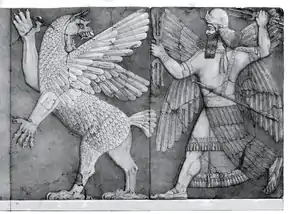| Abzu | |
|---|---|
| Personal information | |
| Consort | Tiamat |
| Children | Kingu (Babylonian religion), Lahamu, Lahmu, Anu (Sumerian religion) |
| Part of a series on |
| Ancient Mesopotamian religion |
|---|
 Chaos Monster and Sun God |
|
|
The Abzu or Apsu (Sumerian: 𒀊𒍪 abzu; Akkadian: ![]()
![]() apsû), also called engur (Cuneiform:𒇉, LAGAB×HAL; Sumerian: engur; Akkadian: engurru—lit. ab='water' zu='deep', recorded in Greek as Ἀπασών Apasṓn[1]), is the name for fresh water from underground aquifers which was given a religious fertilising quality in Sumerian and Akkadian mythology. Lakes, springs, rivers, wells, and other sources of fresh water were thought to draw their water from the abzu. In Sumerian and Akkadian mythology, it is referred to as the primeval sea or the river below the void space of the underworld (Kur) and the earth (Ma) above.
apsû), also called engur (Cuneiform:𒇉, LAGAB×HAL; Sumerian: engur; Akkadian: engurru—lit. ab='water' zu='deep', recorded in Greek as Ἀπασών Apasṓn[1]), is the name for fresh water from underground aquifers which was given a religious fertilising quality in Sumerian and Akkadian mythology. Lakes, springs, rivers, wells, and other sources of fresh water were thought to draw their water from the abzu. In Sumerian and Akkadian mythology, it is referred to as the primeval sea or the river below the void space of the underworld (Kur) and the earth (Ma) above.
In Sumerian culture
In the city of Eridu, Enki's temple was known as E2-abzu (house of the deep waters) and was located at the edge of a swamp, an abzu.[2] Certain tanks of holy water in Babylonian and Assyrian temple courtyards were also called abzu (apsû).[3] Typical in religious washing, these tanks were similar to Judaism's mikvot, the washing pools of Islamic mosques, or the baptismal font in Christian churches.
In Sumerian cosmology
The Sumerian god Enki (Ea in the Akkadian language) was believed to have lived in the abzu since before human beings were created. His wife Damgalnuna, his mother Nammu, his advisor Isimud and a variety of subservient creatures, such as the gatekeeper Lahmu, also lived in the abzu.[4][5][6][7][8]
As a deity
Abzu (apsû) is depicted as a deity[9] only in the Babylonian creation epic, the Enūma Eliš, taken from the library of Assurbanipal (c. 630 BCE) but which is about 500 years older. In this story, he was a primal being made of fresh water and a lover to another primal deity, Tiamat, a creature of salt water. The Enūma Eliš begins: "When above the heavens (e-nu-ma e-liš) did not yet exist nor the earth below, Apsu the freshwater ocean was there, the first, the begetter, and Tiamat, the saltwater sea, she who bore them all; they were still mixing their waters, and no pasture land had yet been formed, nor even a reed marsh." This resulted in the birth of the younger gods, who later murdered Apsu in order to usurp his lordship of the universe. Enraged, Tiamat gives birth to the first dragons, filling their bodies with "venom instead of blood", and made war upon her treacherous children, only to be slain by Marduk, the god of Storms, who then forms the heavens and earth from her corpse.
In popular culture
Abzû is a 2016 adventure game that was influenced by Sumerian mythology of Abzu.[10]
See also
Notes
- ↑ Maul, Stefan (October 2006). "Apsȗ". In Francis G. Gentry (English edition) (ed.). Brill's New Pauly. Brill. doi:10.1163/1574-9347_bnp_e129820. ISBN 9789004122598.
- ↑ Green, Margaret Whitney (1975). Eridu in Sumerian Literature. University of Chicago: Ph.D. dissertation. pp. 180–182.
- ↑ Jeremy Black and Anthony Green, 1992. Gods, Demons, and Symbols of Ancient Mesopotamia: an illustrated dictionary, s.v. "abzu, apsû". ISBN 0-292-70794-0.
- ↑ Orlin, Eric (2015-11-19). Routledge Encyclopedia of Ancient Mediterranean Religions. Routledge. p. 8. ISBN 978-1134625529.
- ↑ Horowitz, Wayne (1998). Mesopotamian Cosmic Geography. Eisenbrauns. p. 308. ISBN 0931464994.
- ↑ Putthoff, Tyson (2020). Gods and Humans in the Ancient Near East. Cambridge University Press. p. 71. ISBN 978-1108490542.
- ↑ Eppihimer, Melissa (2019). Exemplars of Kingship: Art, Tradition, and the Legacy of the Akkadians. Oxford University Press. p. 188. ISBN 978-0190903015.
- ↑ N. Pope, Charles (2016). Living in Truth: Archaeology and the Patriarchs (Part I): Early Pharaohs. DomainOfMan.com. p. 17.
- ↑ Jordan, Michael (1993). Encyclopedia of gods: over 2,500 deities of the world. New York: Facts on File. p. 2. ISBN 9780816029099 – via Internet Archive.
- ↑ Haske, Steve (2016-09-27). "Exploring the Hidden Depths of 'Abzû'". Inverse. Archived from the original on 2017-03-09. Retrieved 2017-04-22.
External links
 Quotations related to Abzu at Wikiquote
Quotations related to Abzu at Wikiquote
_-_EnKi_(Sumerian).jpg.webp)